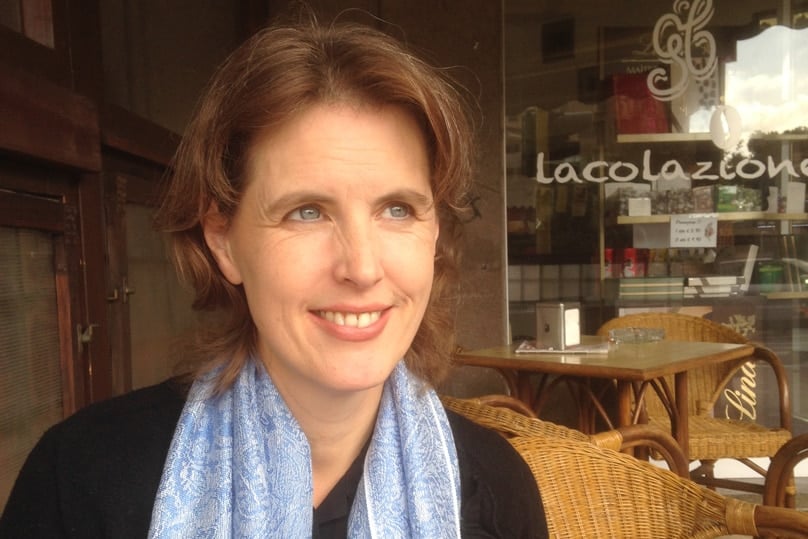
Who else loves a good conversion story? I’ve known many, but found it a great grace to begin the year reading Sally Read’s memoir of her conversion, Night’s Bright Darkness.
As a psychiatric nurse in London Sally lived a ‘Sex in the City’ lifestyle with friends through her 20s. She became an accomplished poet, married in her early 30s and settled down in Italy with her husband where they welcomed the birth of a daughter.
At the end of 2010 she was confirmed and received her first Holy Communion in the chapel of Santa Marta in Rome, where Pope Francis now lives, after a dramatic nine-month conversion from atheism to a deep relationship with Jesus and love for the Catholic Church.
Her book is above all, “a love letter in response to love”.
“Without the encounter with Christ and the love that this inspires,” she writes “no true conversion is possible”.
During 2010 Sally had intense experiences of God which she found echoed in St John of the Cross’ mystical poem, Dark Night of the Soul. Not everyone can relate to that, of course, but it’s impressive.
Her spiritual life today, embedded in routines of Mass-going and prayer, is “more workaday”. She sometimes struggles to pray, sometimes realises she’s forgotten about God all day. And perhaps we can all relate to that.
I’m a cradle Catholic but love a good conversion story, as many of us do. Perhaps it’s because we have all experienced moments of conversion, small and great. We have all wrestled with questions about God and faith, life and death, suffering, or where we come from, where we’re going, and what it’s all about. We have painfully wanted to see God at times, and at others, received some dim yet startling impression of his gaze already on us.
But more than that, a good conversion story, whether it’s Augustine’s Confessions or an interview on EWTN’s The Journey Home program, is one where the person has looked inside themselves and over their lives and put his or her finger on the action of God in both of these realities. And this is the same God who loves me. We not only see ourselves and our struggles and joys; we see something of God too. And with a surge of recognition and love, we admire the handiwork of the One we love.
A little glimpse, perhaps, of what it will be like to be together in heaven, marvelling over our Father’s work. Stories such as Sally’s tell us much about God, for example:
It’s God who converts people
God converts souls, using an unfathomable economy of grace where nothing is wasted. Sally is clearly grateful to the priest who befriended her and patiently answered all her questions about God and faith. But she’s also grateful for her father’s life-long atheism, which she had embraced.
“He prepared me to know God. In his atheism, he stripped me of all pretence and selfishness and false worship and rights with regard to God. He taught me to kneel to nothing false, to have no false master.”
Judge not your brother (or sister)
Sally was convinced there was no God and had been comfortable in a culture where one impressed by wearing “shoes to die for”, and by the number of notches on the bedpost. As a 30-something married to an Italian man and attending a Catholic mothers’ group she remained bewildered and repulsed by religious faith, especially Catholicism, and outspoken in her rejection of it.
God can do much more with so-called or even self-proclaimed ‘lost causes’ than we sometimes imagine. It’s impossible for us to judge what is happening within a person, where God resides.
The Eucharist draws us and enlivens our faith
Everyone’s trying to achieve “cut through” today, to get above the noise of competing for our attention. Who in the world is more silent than Jesus in the Eucharist? Yet the Eucharist continues to draw people to the Church.
It was when she spent an afternoon looking for refuge in a church, when she was still full of unsettled questions, that she realised she was in one sense “already Catholic”.
God is revealed in the poor and forgotten
As a young nurse, Sally was deeply affected by the plight of some of her patients. These included a man with severe disabilities who had his feeding tube removed and was starved to death, despite her attempt at advocacy on his behalf. Remembering him now, she recognises Christ.
Seek and you will find, eventually
Sally’s story shows what happens when one waits upon God, as open and receptive and as one can make oneself. Certainly, the waiting isn’t comfortable, and it’s easier for some than others.
Being a poet and in the habit of waiting for insights certainly helped Sally to do that, but it is something we are all made to cultivate; a space within ourselves to receive the gift of God. We need only become aware of our desire for it, to ask Jesus to help us, and he will come.
